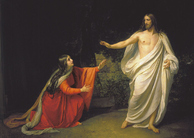The Matthaean Exception Clause: A 21st Century Interpretation
By
2010, Vol. 2 No. 10 | pg. 1/1
IN THIS ARTICLE
AbstractSexism is not unique to Christianity; however, in the Christian religion many of those who identify themselves as Christian fundamentalists are more likely to hold sexist views of women. Because the scriptures were written during a time in which women had few rights, laws regarding conduct favored males. The new 21st Century interpretation of the Matthaean exception clause now encompasses the various domestic issues which compromise the bonds of matrimony. This interpretation looses women from the chains of sexist fundamentalist interpretations and binds everyone to a new standard in which integrity to one’s commitments is the plum line for divorce.
Sexism in the Bible is not a new field of study; however each scholar takes it upon themselves to contribute new elements not yet considered in the body of literature. Sexism is usually defined as a predominance of patriarchal views which subjugate women. Of all literary works, the Bible is a major source in which patriarchal and sexist views are portrayed and justified. Recent scholarship posits that sexism in Christianity is more prevalent among Christian fundamentalists (Peek, Lowe & Williams 1991), with fundamentalism defined as interpreting the Bible as literal (Peek, Lowe & Williams 1991; Ammerman 1987; Jelen 1987). Although we live in a time of improving gender equality, Christians and Jews still use the Bible and Torah to justify certain limitations on women. One predominate limitation is coerced marital faithfulness despite the unsavory behavior of a woman's spouse. The Matthaean “exception clause” at the surface only allows for divorce if one fornicates, yet it doesn’t cover issues such as misrepresentation, criminal behavior, or marital rape. This study will expose the sexism postulated by literalist interpretations of Malachi 2:16, Matt 19:9, Mark 10:2-12, and Luke 16:18 and employ the method of “binding and loosing” to formulate a non-sexist, 21st Century interpretation of the Matthaean “exception clause.” This interpretation will encompass the various domestic issues which compromise the bonds of matrimony. I. The Justification of A New InterpretationWhat is not suggested by a formulation of this interpretation is that the Bible is invalid. Rather the law given was necessary and narrowly tailored to suit the needs of the intended audience – the Jews at the respective time. Two factors necessitate the need for a new interpretation. First, the laws found in the law books of the Torah (i.e. Exodus, Leviticus, Numbers, and Deuteronomy) have changed over time, that is, from book to book. Secondly, the Mosaic Law which governed the societies in which the Torah and the Gospels were written does not have jurisdiction in America. Form criticism will be employed to support the first assertion, while the fact that Mosaic Law doesn’t have jurisdiction in America is supported by the existence and acceptance of our constitution as fundamental law. Form criticism asserts that Bible critics should first identify the genre of the particular text of interest, and second, identify the sociological factors surrounding the time of the text. The genre of the texts selected for this study is legal code. Based upon the limitations on women, one sociological factor affecting the writers of the Torah and the Gospels is the inequity of the treatment of women. It is evident that women were not regarded as equal citizens as (a) men are shown as leaders and women as followers (Peek et al. 1991, Neville 1974, Wilson 1973) and (b) women were not afforded equal protection under Mosaic Law. When a literalist interpretation of the aforementioned scriptures is applied, the interpreter binds women to the same limitations as did the Jews of the sixth century BCE to 85 ACE.During this duration of time, the social norms and laws governing Jewish society evolved. Some believe that the Torah is consistent in its stance on subject matters, yet as one closely reads Exodus [written between 1279-1213 BCE], Leviticus [written after 586 BCE] and Deuteronomy [written in 622 BCE], there are differences in how Jewish communities regarded the same subject matter (Brettler 2007). For example, Brettler found that the Torah’s stance on slavery is inconsistent: Most significant is the way in which Exodus differentiates between the treatment of male and female slaves whereas Deuteronomy insists that they should both be treated similarly. While Exodus and Deuteronomy agree that a slave who loves his master may opt to remain a slave ‘for life’ (Ex 21.6) or ‘forever’ (Deut 15.17), Lev. 25 insists that slavery does not really exist, since slaves must be treated ‘as hired or bound laborers,’ and they may only serve ‘until the year of jubilee’ (v.40). Such legal differences are not surprising once one is open to the hypotheses that the Bible is composite, and that the different legal collections reflect norms or ideals of different groups living in different times. (5) It is indisputable that social norms have changed from Genesis (sixth century BCE) to Luke (85 ACE) and therefore interpretation must of necessity change also. If legal code adapted to the social norms of the time in which the specific code was written, why shouldn’t American’s interpret biblical code law pursuant to the Fifth and Fourteenth Amendments which prohibits the abridgement and deprivation of “life, liberty, or property without due process of the law?” II. Case Study: Marital Rape Justified By A Literalist InterpretationA 1990 study conducted by Diana Russell showed that 10 to 14 percent of wives suffered marital rape. One of the causes of marital rape is the sexist view that wives belong to their husbands, therefore husbands are “entitled to sex” (Bergen 1996, Thio 2009, Ferro et al. 2008). Such views can be justified by literal interpretations of Genesis 3:16, 1 Corinthians 7:5, Ephesians 5:22-23, and Colossians 3:18-19. Genesis 3:16 states, “Unto the woman he said, I will greatly multiply thy sorrow and thy conception; in sorrow thou shalt bring forth children; and thy desire shall be to thy husband, and he shall rule over thee” (KJV). Notice the last charge to the women from God, and he [the husband] shall rule over her. Interpreting this scripture literally, just as a king can demand service from his subordinates, a husband can demand service from his wife. If the service happens to be sex, if she is unwilling he has the God given right to enforce his ruling. 1 Corinthians 7:5 reads, “Defraud ye not one the other, except it be with consent for a time, that ye may give yourselves to fasting and prayer; and come together again, that Satan tempt you not for your incontinency” (KJV). The Apostle Paul is writing about sex and instructs them not to defraud or withhold sex from one another except it be with συμφωνος (consent). The Greek word συμφωνος means sounding together or accordant. This means that sex can only be withheld if both parties agree not to engage. Literally, Paul writes that sex must occur as long as one desires it and can only be withheld if both agree to abstain. Paul writes in Ephesians 5:22-23, “Wives, submit yourselves unto your own husbands, as unto the Lord. For the husband is the head of the wife, even as Christ is the head of the church: and he is the saviour of the body” (KJV). Paul equates the superiority of the husband over his wife to Christ’s superiority over the church. Ergo saying “no” to your husband is like saying “no” to Christ? Paul issues the same writ of mandamus to the Colossian Church as well. When these scriptures are put behind the back drop of the husband’s desire for sex, the wife has no choice but to let him “rule over her.” Yet in America, non-consensual sex is rape no matter if in or outside of wedlock. Which side should Americans propagate, 85 ACE or 21st Century civil standards? III. Binding and LoosingAccording to Exodus 12:49, Mosaic Law was the fundamental law of Jewish civilization. Additionally, this law governed Jews and Gentiles which lived in the region of justiciability. The law handed down by Moses is vast yet it centers on the Ten Commandments given to the people of Israel. The additionally books of law were written in response to the needs of a growing society in which the original Ten Commandments were not sufficient to guide the society in all realms of righteous living. For example, the Ten Commandments didn’t address Priestly Order, Leviticus did. Health Codes were not addressed in the Ten Commandments, Leviticus and Deuteronomy expands Jewish Code Law regarding the same. Each Jewish era brought with it specific behavioral challenges in which Mosaic Law failed to determine the action’s lawful status. If this failure perpetuated, the legitimacy of Mosaic Law would cease. To prevent the loss of legitimacy, Rabbis, who had the right to adjudicate, would participate in “binding and loosing” (Drury 2008, Bell 2006, Powell 2003, Derrett 1983). The biblical account for “binding and loosing” is found in Matthew 16:19 where Jesus states, “And I will give unto thee the keys of the kingdom of heaven: and whatsoever thou shalt bind on earth shall be bound in heaven: and whatsoever thou shalt loose on earth shall be loosed in heaven” (KJV). There is an accepted belief that this right to bind and loose was spiritual, giving the church the right to exorcism (Duling 1987). Yet, Form Criticism and close reading of the text would suggest another interpretation. Jesus on numerous occasions was referred to as Rabbi (i.e. Matthew 26:25; Mark 9:5, Mark 11:21, John 1:38, etc). It was rabbinical duty to interpret the law in order to extend its legitimacy regarding contemporary situations (Powell 2003; Bell 2006). The Rabbi would critically review the scriptures in light of the current situation and loose the restriction(s) propagated by previous interpretations from his community and/or bind them to the standards detailed in new interpretations of the scripture. Each Rabbi would have a “yoke” which means a body of and a means to which they interpreted Jewish law. Jesus, acting as Rabbi, states in Matthew 11:30, “For my yoke is easy and my burden is light” (KJV). Jesus doesn’t dispute the fact the he is a Rabbi and that he works in the authority to “bind and loose.” Jesus does so in many occasions and the occasion pertinent to this study is in Matt 19:9, Mark 10:2-12, and Luke 16:18, which he discusses divorce. In Matthew 19:9, the Pharisees came to test Rabbi Jesus’ ability to and interpretation of Mosaic Divorce Law. Jesus, interpreting the law consistent with the prevailing social norms of his time, ruled one exception for divorce – fornication. Jesus’ ruling wasn’t incorrect per se, yet it is the social factor of gender inequality that makes Jesus’ interpretation unacceptable in vultus of the Fourteenth Amendment. The Bible doesn’t address all types of social deviance or complex social issues which cause one to seek divorce. The goal of binding and loosing is to resolve conflicts which perplex the community (Derrett 1983). The objective of this study is to show the sexism found in the scriptures, with emphasis on those detailing the exception(s) of divorce (i.e. Malachi 2:16, Matt 19:9, Mark 10:2-12 and Luke 16:18), and to critically analyze the original Greek text and form a new 21st Century interpretation to free women from the subjugation of the Judeo-Christian fundamentalist view of the Matthaean “exception clause.” IV. Historical Account of Sexism in the BibleDuring the 18th Century, with the first-wave of feminism, America became more sensitive to the gross inequity of women in the public sector. During this time Virginia Woolf’s writings began to expose anti-feminist views in politics and enterprise. Of her works the “Professions of Women” stands especially pertinent to our discussion. In 1931 Woolf addressed an audience at the Women’s Service League regarding the employment of women. Many scholars (e.g. Carroll 1978) interpret this work as political speech rallying change in laws and enterprise. Yet, it unearths more than inequitable laws; it points to an origin on such laws – the Bible. In Woolf’s speech she confessed her struggle with personal expression in writing because of what she deemed as “The Angel of the House.” Woolf’s description of the Angel was the compilation of man’s opinion of how women should behave. Woolf’s Angel tried to pluck the heart out of her professional writing and keep her subjugated to patriarchal ideologies (589). Woolf states that “every house had its Angel” (589). Notice the word “angel.” An angel, carrying a message to mankind, is believed to be a celestial being sent by God. Woolf’s use of the word “angel” depicts that its ideas are not from man, but from God. Thus, man believes that women should act a certain way because they were made to do so by God. The basis of this Judeo-Christian belief is the literal interpretation of Genesis Chapter 3, Adam and Eve’s banishment from the Garden of Eden. Verse 16 states, “Unto the woman he [God] said, I will greatly multiply thy sorrow and thy conception; in sorrow thou shalt bring forth children; and thy desire shall be to thy husband, and he shall rule over thee” (King James Version (KJV)). A literalist interpretation would state that the woman’s curse was degrading. Her equal status with man was stripped and she was forced into servitude because she entertained a conversation with the serpent which led her to a defiance of God’s instruction. This belief is propagated by religious leaders throughout time. Martin Luther, the leader of the Christian Reformation, states in a personal letter, “If they [women] become tired and even die, that does not matter. Let them die in childbirth, that’s why they are there” (Ellerbe). St. Tertullian in 155 after the Common Era (ACE) addressed the women in his parish: Do you not know that you are each an Eve? The sentence of God on this sex of yours lives in this age: the guilt must of necessity live too. You are the Devil’s gateway: You are the unsealer of the forbidden tree: You are the first deserter of the divine law: You are she who persuaded him whom the devil was not valiant enough to attack. You destroyed so easily God’s image, man. On account of your desert even the Son of God had to die. (Vurren) These ideologies were founded upon the belief that God subjugated woman to man. John Locke argues in “The Second Treatise” regarding the basis of such ideologies that “God in this text, gives not, that I see, any Authority of Adam over Eve, or to Men over their Wives, but only foretells what should be the Woman[’]s Lot…” (I, 47). It is this lot that is perpetrated by literalist interpretations of Genesis 3:16 that keep women oppressed and locked way in Rapunzel's tower of obscurity. In analyzing Genesis 3:16 and the aforementioned commentators, it appears that the root cap of the employment of a literalist interpretation is man’s fear of loss. The Garden of Eden was Adam and Eve’s joint grubstake given by God. Eve’s disobedience toward God’s laws resulted in both her and Adam’s loss of God’s investment. Although Adam was a coconspirator, his loss seemly caused a hereditary distrust toward women. This distrust implies that women are unable to have mutual ownership of man’s enterprise because the last time she did, her ambition caused them both to lose what they had. Therefore, the man provides her with a house, with children to preoccupy and appoints her as a custodian of his home. Some biblical scholars call the above the classic patter of the institution of marriage (Olshewsky 1979). This position limits the wife’s involvement with her husband’s assets and, therefore, in some cases mitigates his loss if she chooses to disobey his ordinances. This ideology flies under the radar undetected because this is learned behavior; it is erased law indented in our masculine essence. Yet, there is one action that can cause man to lose investments, house, and children – divorce. Although divorce was permitted in Jewish, European and American society, it was highly discouraged as there was great “social pressure against divorce…”(Friedman & Percival 1976) which brought upon the woman a “heavy stigma” (Friedman & Percival 1976). A subset of the social pressure was/is religious pressure. The pretense of anti-feminists was/is to take a literalist interpretation of the scriptures in order to preserve patriarchal hierarchy and dissuade women from becoming the “Fallen Woman” – the divorce woman. Such dissuasion mitigates the chances of divorce, ergo mitigating the loss of capital that comes with divorce. These scriptures used to dissuade women from seeking divorce are Malachi 2:16, Matthew 19:9, Mark 10:2-12, Luke 16:18. Malachi 2:16, states “For the LORD, the God of Israel, saith that he hateth putting away: for one covereth violence with his garment, saith the LORD of hosts: therefore take heed to your spirit, that ye deal not treacherously” (KJV). Mathew 19:9 states, “And I say unto you, Whosoever shall put away his wife, except it be for fornication, and shall marry another, committeth adultery: and whoso marrieth her which is put away doth commit adultery” (KJV). Mark 10:11-12 states, “And he saith unto them, whosoever shall put away his wife, and marry another, committeth adultery against her. And if a woman shall put away her husband, and be married to another, she committeth adultery” (KJV). Luke 16:18 state, “Whosoever putteth away his wife, and marrieth another, committeth adultery: and whosoever marrieth her that is put away from her husband committeth adultery” (KJV). Malachi is the last book of the Hebrew Bible written in the 5th century before the Common Era (BCE). Malachi 2:16 doesn’t explicitly mention the word divorce; however, the phrase “putting away” is the English translation of the Hebrew word “שלח” which means “to send away”. According to the New Oxford Annotated Bible the context in which the word is used suggests that the text is speaking about divorce (1373). Based upon the above, in no uncertain terms the Hebrew Bible details that God hates divorce. Yet, as Jesus alludes to in Matthew, Mosaic Law details provisions for divorce in Deuteronomy 24:1-4. It is evident that Mark and Luke did not place the “except for” clause about divorce found in Matthew in his writings. If we focus on Mark and Luke’s interpretation, we are lead to believe that divorce is not permissible under any circumstance. However, if we observe Matthew’s account, there is one notable exception – fornication. Keep in mind that the Gospel according to Mark was written between 55–65 ACE, Matthew was written in 70 ACE and Luke was written in 85 ACE. Although Mark’s Gospel was written prior to Matthew’s, it does not mean that Mark’s account is more accurate than Matthew’s. Because the last canonization of the Bible holds that Matthew, Mark and Luke’s Gospel passes biblical muster, we hold that all accounts are valid. However, since Matthew’s account provides an exception which is consistent with Mosaic Law, this study will critically review Matthew’s account. When Matthew writes that Jesus said, “And I say unto you, whosoever shall put away his wife, except it be for fornication, and shall marry another, committed adultery and whoso marrieth her which is put away doth commit adultery” (Matt 19:9 KJV); the word fornication is the Greek word “porneia”. Porneia is the action or process of porneuw – “to act the harlot, i.e. (literally) indulge unlawful lust (of either sex), or (figuratively) practice idolatry:--commit (fornication)” (SpeedBible). Please be critical of this word and notice that it is gender specific in that one is “to act the harlot.” To be more literal, “porneuw” is a derivative of the Greek word “pornh” which is the feminine tense of the Greek word “pornoV” which means “a (male) prostitute (as venal), i.e. (by analogy) a debauchee (libertine):--fornicator, whoremonger” (SpeedBible). Understanding the aforementioned, it stands to reason that the feminine tense of the Greek word used in Matthew 19:9 limited the privilege of divorce to males only. In other words, a man could divorce his wife if she were an adulteress; yet this right, based on the above, was not afforded to women in the event that her husband was an adulterer. This interpretation is sound given that there is a Greek word to describe a whoremonger, yet it is not used rather the feminine tense is used. To further solidify this gender discrimination found in the Bible, we turn to the Code of Jewish Law written by Rabbi Solomon Ganzfried, a Ukrainian religious judge. In Chapter 145 section 23 he writes, “A respectable man should not marry a woman who has been divorced because of immodesty.” Section 24 states, “It is mandatory to divorce a bad woman who is of a quarrelsome disposition and is not as modest as a respectable woman in Israel should be, even if it is the first marriage.” Such legal stipulations are not present regarding men. Literalists of the aforesaid code law and scriptures may not expect to be guiltless if the male commits adultery; however, the literalist interpretation does emphasize the one exception – adultery. Thankfully, Jewish code law doesn’t have jurisdiction in the United States; yet, the Bible to Christian fundamentalist is the “true plumb line” (Amos 7:7) by which they live. This means that they will by reason enforce the ideologies of their fundamentalism (Peek, Lowe & Williams 1991; Ammerman 1987; Jelen 1987). The Fourteenth and Nineteenth Amendments criminalize du jure discrimination, yet the First Amendment limits its ability to interfere with de facto discrimination propagated by Judeo-Christian beliefs. In light of the above and following the guidelines of binding and loosing, how should Americans interpret these scriptures in response to the aforementioned amendments? One should first, identify the fundamental law, second, observe the prevailing ideology regarding the matter, third, find any alternative definition to the text, fourth, find biblical evidence wish supports the alternative definition and six, create the interpretation. V. New Interpretation of the Matthaean Exception ClauseThe word “porneia” found in Matthew 19:9 also has a figurative definition which means to practice idolatry. Idolatry is defined as “the worship of a physical object as a god”. The Prophet Hosea uses the Hebrew word “ניאוף”(adultery, fornication, whoredom) as an analogy for Israel’s idolatry. Hosea 1:2 states, “The beginning of the word of the LORD by Hosea. And the LORD said to Hosea, ‘Go, take unto thee a wife of whoredoms and children of whoredoms: for the land hath committed great whoredom, [departing] from the LORD’” (KJV). This analogy is also seen in Hosea 4:10-14, Jeremiah 3:1-13, and Ezekiel 16:26. Understand that the word idolatry is not enunciated in the Ten Commandments; God required that “Thou shalt have no other gods before me.” (Ex. 20:3 KJV). Please understand that God, according to Hebrews 6:13-20, swore by himself in an oath to Abraham since there was none greater than Himself. Bearing the above in mind, God knew there were no other gods. Understanding this, one can conclude that the commandment meant for its observers not to place anything above one’s commitment to God. Since Matthew, citing Jesus, uses the Greek word “porneia” in the context of marriage and divorce, it would serve to reason that the figurative definition could be applied to mean, “placing something above the commitment of or made in marriage.” Another definition of idolatry is: “immoderate attachment or devotion to something.” Given the above definitions’ merit coupled with the legitimacy of the Fourteenth and Nineteenth Amendments, the 21st Century interpretation of Matthew 19:9’s exception for divorce is that divorce is permitted if one member of the relationship is immoderately attached or devoted to something which results in a consistent or profound event which places something above the commitment(s) of or made in marriage. VI. ConclusionThis 21st Century interpretation of the Matthaean “exception clause” encompasses the various domestic issues which compromise the bonds of matrimony. Additionally, as Christian and other religious leaders in America begin to loose women from literalist interpretations, they will increase religious gender equality. Some critics may raise concern about how this interpretation will increase the “Christian” divorce rate. Yet, this critic is not rooted in the concern for the couple or family, rather in trying to protect the “positive impact” Christianity has on marriage. Logically, couples with significant martial issues divorce, but the absence of divorce doesn’t mean the absence of significant martial issues. Just because a couple is together doesn’t mean they should stay together, and if Christ came to set the captive free (Luke 4:18), why would we suggest or coerce people to remain captive in a damaging relationship. One must be able to obtain a divorce without religious pressure in the event when one member of the relationship is immoderately attached or devoted to something which results in a consistent or profound event which places something above the commitments of marriage.
References Ammerman, Nancy Tatom. Bible Believers: Fundamentalists in the Modern World. New Jersey: Rutgers University Press, 1987. Print. Bell, Rob. Velvet Elvis: Repainting the Christian Faith (Cover Image May Vary). New Ed ed. Grand Rapids, Michigan: Zondervan, 2006. Print. Bergen, Raquel Kennedy. Wife Rape: Understanding the Response of Survivors and Service Providers (SAGE Series on Violence against Women). 1 ed. Thousand Oaks: Sage Publications, Inc, 1996. Print. Carroll, Berenice . "'To Crush Him in Our Own Country': The Political Thought of Virginia Woolf." Feminist Studies 4.1 (1978): 99-132. Print. Derrett, Ducan. "Binding and Loosing (Matt 16:19; 18:18; John 29:23)." Journal of Biblical Literature 102.1 (1983): 112-117. Print. Ellerbe, Helen. The Dark Side of Christian History. Orlando, FL: Morningstar Books, San Rafael, Ca, 1995. Print. Ferro, Christine, et al.. "Current perceptions of maritial rape: Some good and not-so-good news.." Journal of Interpersonal Violence 23 (2008): 764-779. Print. Friedman, Lawrence M., and Robert V. Percival . "Who Sues for Divorce? From Fault through Fiction to Freedom." The Journal of Legal Studies 5.1 (1976): 61-82. Print. Ganzfried, Solomon. Code of Jewish Law. Jerusalem: Hebrew Publishing Company, 1961. Print. “Idolatry." Merriam-Webster Online Dictionary. 2010. Merriam-Webster Online. 03 January 2010 <http://www.merriam-webster.com/dictionary/idolatry> Jelen, Ted. "The Effects of Religious Separatism on White Protestants in the 1984 Presidential Election." Sociological Analysis 48 (1987): 30-45. Print. Locke, John. John Lock Two Treaties of Government. Cambridge: Cambridge University Press, 1988. Print. McDowell, Josh. The New Evidence That Demands A Verdict Fully Updated To Answer The Questions Challenging Christians Today. Rev Upd ed. Waco, TX: Thomas Nelson, 1999. Print. Neville, Gwen Kennedy. “Religious Socialization of Women within U.S. Subcultures.” Sexist Religion and Women in the Church. Ed. Alice Hageman. Association Press. (1974) 77-91. Olshewsky, Thomas. "A Christian Understanding of Divorce." The Journal of Religious Ethics 7.1 (1979): 118-138. Print. Peek, Charles, George Lowe, and Susan Wiliams. "Gender and God's Word: Another Look aat Religious Fundamentalism and Sexism." Social Forces 69.4 (1991): 1205-1221. Print. Russell, Diana E. H.. Rape in Marriage. Rev Exp ed. Bloomington: Indiana University Press, 1990. Print. Thio, Alex. Deviant Behavior (10th Edition). 10 ed. Boston, MA: Allyn & Bacon, 2009. Print. Vurren, Nancy Van. The Subversion of Women as Practiced by Churches, Witch-Hunters, and Other Sexists (1974). Second Printing ed. Philadelphia: The Westminster Press, 1974. Print. Wilson, Martha M. “Woman, Women and the Bible.” Women and Religion. Ed. Judith K. Goldberg. University of Montanan Press (1973): 141-47. Woolf, Virginia. “Professions of Women” The Longman Reader. 8 ed. Ed. Eliza Comodromos, John Langan, and Judith Nadell. New York: Longman, 2006. 588-592. The New Oxford Annotated Bible with the Apocrypha, Augmented Third Edition, New Revised Standard Version, Indexed. 3 Thumbed ed. New York: Oxford University Press, USA, 2007. Print. Suggested Reading from Inquiries Journal
Inquiries Journal provides undergraduate and graduate students around the world a platform for the wide dissemination of academic work over a range of core disciplines. Representing the work of students from hundreds of institutions around the globe, Inquiries Journal's large database of academic articles is completely free. Learn more | Blog | Submit Latest in Theology |











